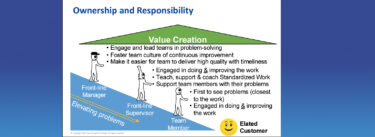Dear Gemba Coach,
Why do you lean guys always focus on shop floor processes? The lack of clarity and focus at headquarters is far worse! As a plant manager, I feel I’ve solved most of the issues our lean coach keeps badgering me about, why don’t they go and kaizen head office instead?
Now, that is an interesting question. There are so many issues there, it’s hard to know what comes first. Let me start by saying that I feel your pain – I see this all the time. Let’s see if I can partially answer your question.
It’s not easy to be a plant manager. Daily life is about:
- Getting production out
- Fighting all the fires burning because of problems arising from our own lack of process mastery here and there
- Dealing with all the nonsense requests from headquarters
Few human beings know how do deal with more than seven issues at the same time on their mental desktop – okay, maybe nine. Beyond that, whatever new file you put on the mental shelf makes another one fall off. This simple cognitive constraint has two very large consequences:
- A lot of operational managers simply get bogged down with issues – like cars on a freeway, at a certain point of saturation, traffic just jams, and this definitely happens to operational management teams;
- Operational managers make (often implicit) choices about how they select issues – it turns out that some of these choices are self-defeating. If you do follow all the headquarters instructions, you’re bound to fail. If you fight headquarters too hard, you will succeed, but they’ll be hunting for your scalp, and any moment of weakness will be used against you. Tough call.
Lean Obsessions
I vividly remember discussing lean with a pharmaceutical management team in Denmark – the operations VP clearly saw the sense of improving safety, quality, delivery, flexibility, and productivity, but, right there in the room, all his functional colleagues: the IT lady, the quality guy, the finance guy, the HR lady started arguing why it would be a terrible idea. Their argument was that they already had systems in place to deal with issues and the main problem was that operations was not implementing the systems rigorously enough. The CEO listened to the majority view and the operations VP had to bite the bullet.
The problem, of course, is none of the systems pushed by the functional directors are actually there to help you produce value. Because of our Taylor/Ford/Sloan legacy, each functional director’s job is to put in a system to reduce costs. The quality director wants to reduce the cost of non-quality (what is that?) the IT director want to optimize the flow in current conditions, the purchasing director’s bonus is tied to his price coefficient and so on. There not there to help you create value – their career hinges on convincing the CEO that their system contributes most to the company’s cost saving efforts. If the CEO hasn’t seen the lean light – that’s that.
The difficulty is compounded by the fact that in too many case the “lean” director operates exactly on the same premises. He or she has to proved that her system – a “lean” one in this case – will most contribute to cost savings. Which is why your plant get swamped with lean headquarters guys with three obsessions:
- Productivity kaizen on lines
- VSM to fix your “value streams”
- “Savings” workshop where they see an opportunity
So yeah, chances are that as an operational manager, the lean program coming to your plant is not there to help – it’s designed to force you to make the headcount reductions your senior management is convinced you have underfoot but don’t want to make. To be fair, in totally non-lean plants, this can actually benefit the plant in the first two years by forcing plant management to see its low hanging fruit and actually realize some obvious improvements. But the story gets old very quickly.
Program Pushers
Which gets us to the third issue – lean consultants you’ll meet are not likely to be very good. For the past 20 years I’ve worked with lean programs in the mid term – the longest I’ve seen is twelve consecutive years, but on the whole, I’ve been counting and I follow through a specific program for four to six years, by which time there’s a management change (Senior exec retires, company gets bought up, etc.) that stops the lean effort as the new guy is clueless and wants it all the way it was before. In that period of time, I can see firsthand that the issues in year four are very different than those in year two. In year six, many of the problems we face are quite deep engineering problems, both in terms of product quality and equipment flexibility. The goal posts move, which is a healthy sign that we’re actually doing lean since the goal of lean is… continuous improvement.
In the process, I’ve witnessed a fair share of headquarters sending in lean consultants to tackle issues that had never been solved, but taken on board by line management for a few years now. This is an interesting problem as, clearly, no line is perfectly level, no operator does 100% value-added work, but after the first few workshops, there is no know way of going beyond other than involving every one every day in kaizen, which means, andon, suggestions, and a lot of frontline management care.
In this situation the new consultant comes in, measures cycle time variation, or counts inventory buffers, and decrees that there is much progress to be done – we can all agree on that. When asked how, the issue becomes trickier because the obvious problems have long been resolved and the consultant is stumped. Many frontline managers are actually working with their teams and engineering at solving these issues at this stage, but this is a messy kaizen process that, unfortunately, the new consultant simply doesn’t get. AND he or she can’t go back to headquarter empty handed – looks bad – so they’ll sing a song about resistance to change and whatnot.
Your question has no obvious answer because of deep, deep problems at three levels:
- As long as the CEO doesn’t take a monozukuri (making the right products the right way) and hitozukuri (developing people in an atmosphere of mutual trust) attitude, the balance of power in any senior management team is biased towards program pushers, not value creators. The point is every one wants innovation, but every one hates innovators. Functional directors tend to support the ideologies of their functional specialties rather than the needs of delivery process to actually deliver more value.
- The lean initiative director is probably part of the problem more than the solution since his or her career depends not so much on helping the business grow its market share and generate cash, but in implementing a program that will deliver savings where all his or her colleagues have failed in the past. This programmatic lean has little more than its name that is lean, but that’s still what many senior execs buy from consultants – it’s such as cash cow because that’s what leadership asks for.
- The consultants in a lean programmatic approach are not likely to be very good at actual kaizen support. Their job is to force standard techniques onto operational managers to prove that further productivity can be squeezed from operations if only you have the will to do so. This works well for the first two years, as a wake up call and clear-the-window practice, but it’s a plain pain in the neck after that when what the plant really needs is a kaizen approach based on respect for operators and leadership from line management.
What can be done? I’m sorry to say that I have no advice at this point – I’ve certainly never convinced a senior manager that hadn’t first convinced himself or herself. The frustrating part of this is that we all know how to generate superior performance. Senior management has to approach work as an athlete and not an administrator. Athletes look at real performance, not effort. Athletes are coached, and the higher the competitive level, the more coaching they look for. Athletes practice every day in order to compete. Athletes understand that the goal posts move that the status quo has to be challenged every day.
Lean is not for every one. Lean is a method invented for the few senior managers who are serious about adapting their organizations to the crazy changes in the markets we’re living through today, and doing so with their people and not against them. This takes a special type of person. Can lean be done at headquarters? Sure, but headquarters has to want it first!






